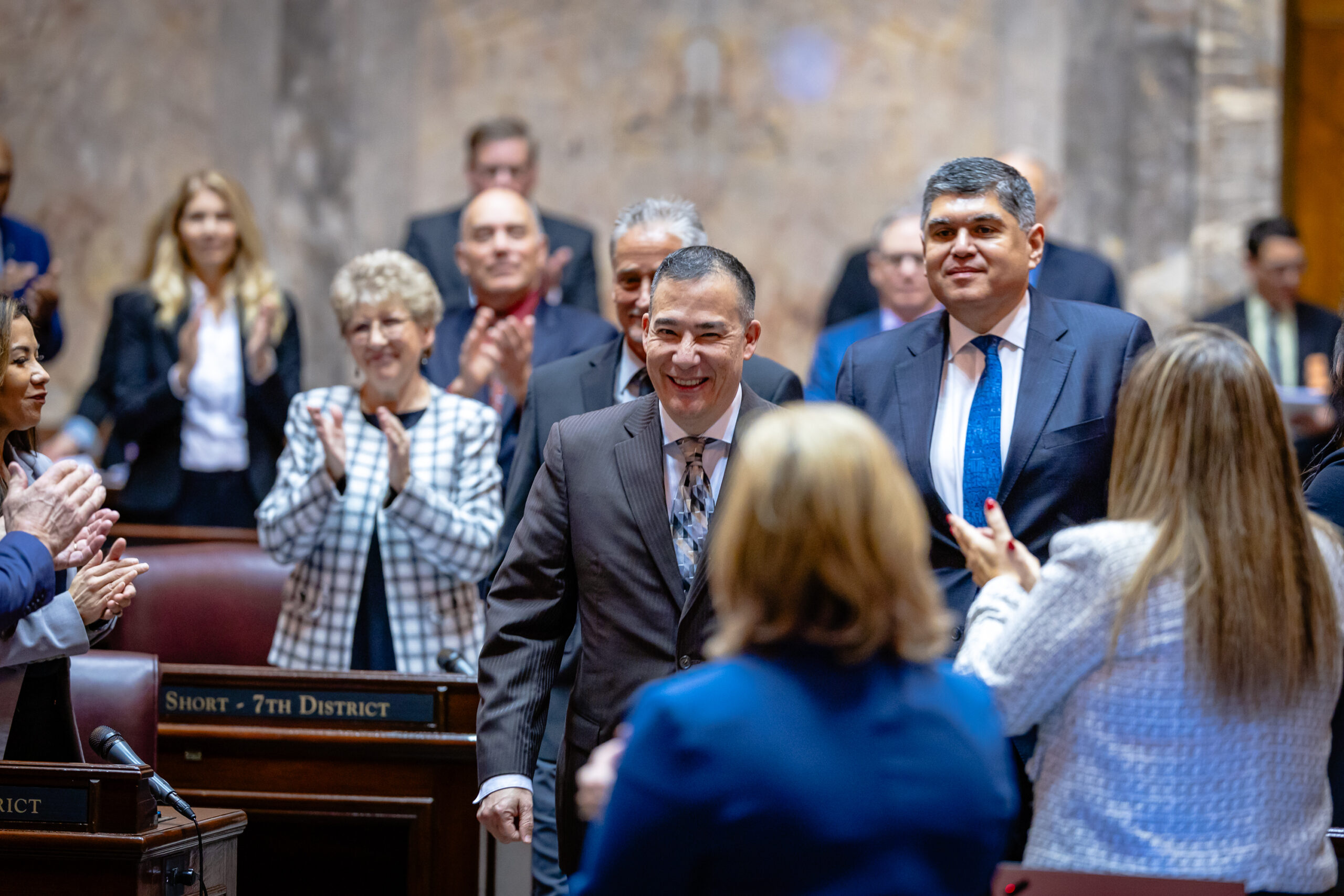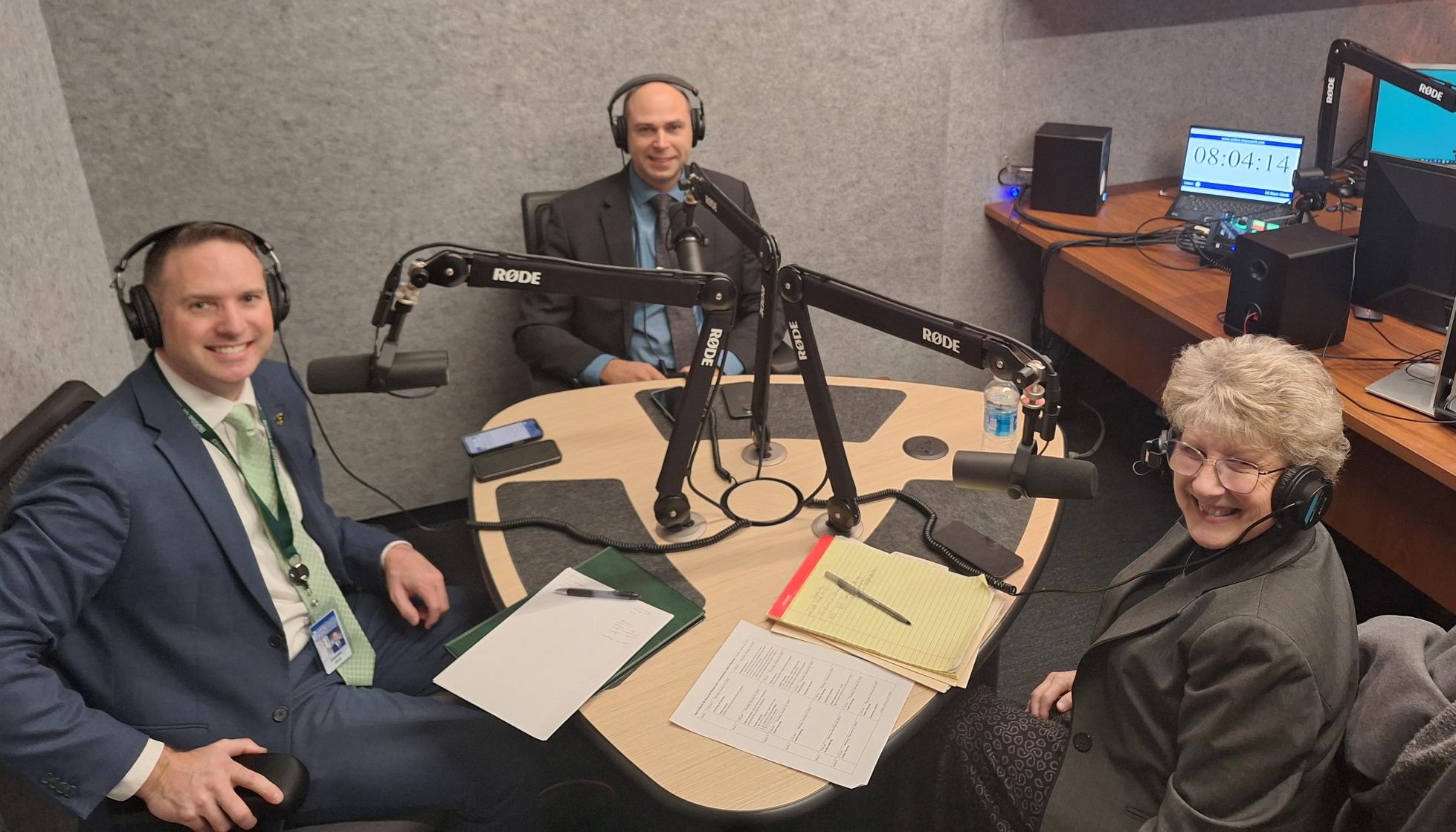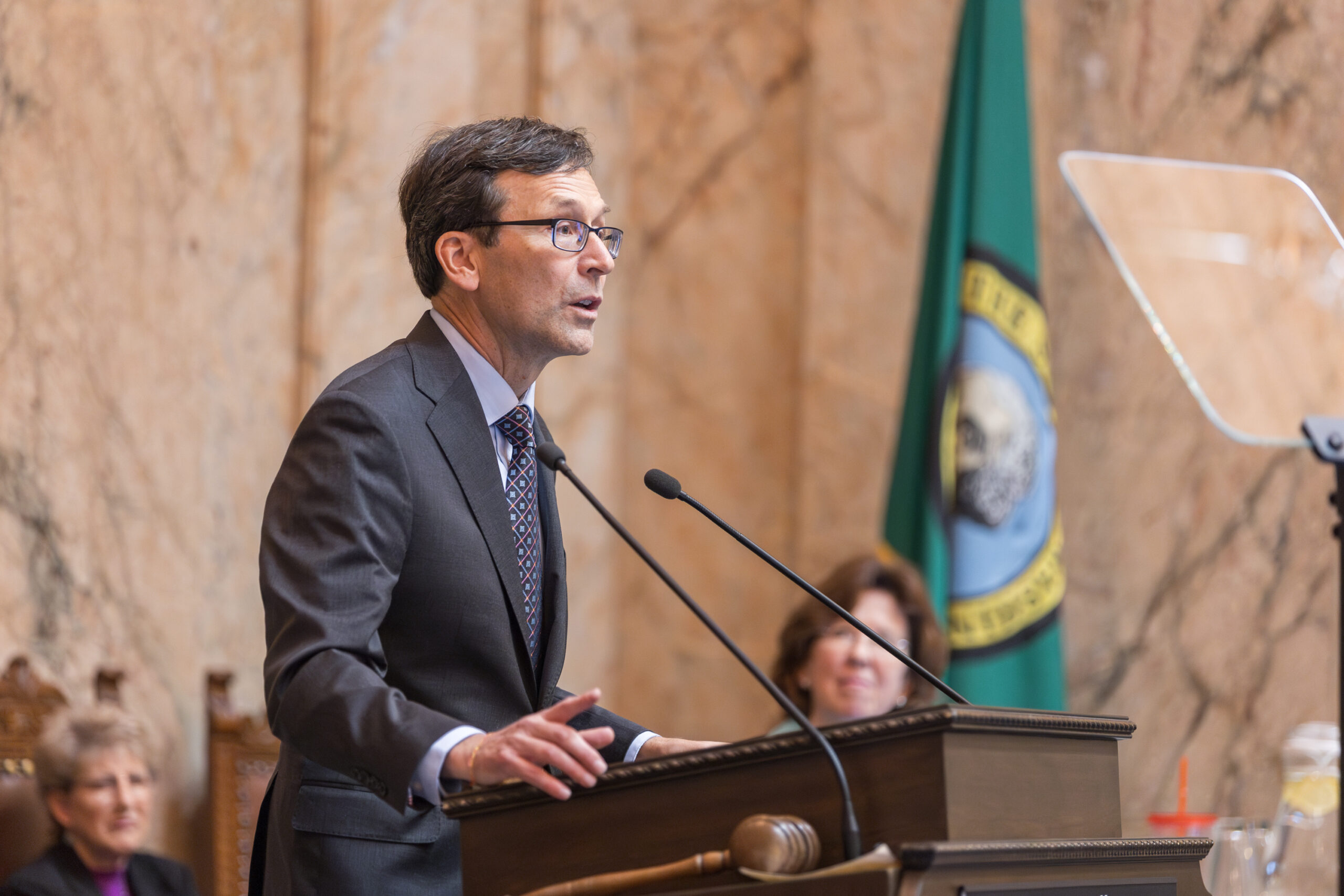Note: The following e-newsletter was delivered to Sen. Shelly Short’s subscribers Jan. 21, 2025. To subscribe to Sen. Short’s e-newsletters, click here.
Washington Secretary of State Steve Hobbs is escorted onto the Senate floor Jan. 13 during opening ceremonies for our 2025 legislative session. The 105-day session is scheduled to end April 27.
Dear Friends and Neighbors,
I don’t think we’ve ever had a budget problem like the one we face this year. We’re back in Olympia for our 2025 legislative session, and our top issue is a budget shortfall of more than $6 billion.
The size isn’t the concern. We’ve faced deficits on this scale before. What makes this shortfall absolutely unique is that it has nothing to do with a national recession or any other circumstance beyond our control. This year’s budget crisis, if it can be called that, is entirely the Legislature’s creation, the result of unfortunate spending decisions made by our majority colleagues over the last several years. Taxpayers this year are being asked to pay the bill for historic overspending, and one way or another, Washington is facing a painful reckoning before this session is through.
Welcome to the 2025 session. This one won’t be easy. And in this newsletter, I want to tell you about some of the issues we can expect to hear about this year.
New boundaries, new faces
With my House seatmates, Hunter Abell (left) and Andrew Engell, as we make our weekly appearance on KOMW radio in Omak, Mondays at 8 a.m.
We live in the 7th Legislative District, the largest and most sparsely populated district of the state, covering all or part of seven counties in north-central and northeastern Washington. The district has new boundaries this year, the result of court-ordered redistricting. The district now encompasses all of Ferry, Okanogan, Pend Oreille and Stevens counties, and parts of Chelan, Douglas and Spokane counties. If you are new to the district – welcome!
I have represented the 7th District since 2009, initially in the House and since 2017 in the Senate. This year we have two new members in our delegation. I am joined by Reps. Andrew Engell, R-Colville, and Hunter Abell, R-Inchelium, who have taken over for Joel Kretz and Jacquelin Maycumber after they chose to step down in the last election. So let me also extend welcome to my new House seatmates! Already they are working hard on the issues we face in the 7th District.
New role on Agriculture Committee
This year I remain floor leader for the Senate Republican Caucus, a key leadership position that puts me in the thick of nearly every debate we have on the Senate floor. As floor leader, I am sort of a “team captain” for the 19 Senate Republicans, making motions and acting as a spokesperson for my side whenever we are in session. This year I also have taken on a new role as ranking Republican on the Senate Agriculture and Natural Resources Committee, making me the lead for my team on issues having to do with agriculture, public lands and natural resources.
I retain my seat on the Environment, Energy and Technology Committee and I am taking on a new position this year on the State Government, Tribal Affairs and Elections Committee. I also serve on the Rules Committee, which determines the bills that advance to the Senate floor for votes.
Budget issue is a matter of priorities
None of our budget problems this year can be considered a surprise. Since our Democratic colleagues took full control of the Legislature in the 2018 session, state spending has skyrocketed. The state budget has doubled over the last decade. We have plenty of money. State economists tell us that we will have $5 billion more to spend than the last time we wrote a budget.
The problem is that it still isn’t enough. To pay for all the new spending obligations our colleagues have created, we would need $6 billion more than we are expecting. And the situation will only become more dire if we do nothing to correct our course. Former Gov. Jay Inslee, whose term ended last week, insisted the problem will grow to a staggering $16 billion in the years ahead. Our Democratic friends are trying to tell us that the only answer is a tax increase, and they are considering a number of proposals that would have a deadly effect on our families, our economy and job creation in our state.
They get no sympathy from me and my fellow Republicans. We are witnessing the natural result of the biggest spending spree in state history. All of us saw it coming. We tried to warn our colleagues against using one-time money to create permanent spending obligations. We argued against accounting maneuvers that allowed them to boost spending by reducing required deposits to the state Rainy Day Fund. We pointed to the folly of assuming good times would last forever. On my side of the aisle this year, we will be working to build coalitions to bring our spending back into line.
An unexpected ally?
Newly inaugurated Gov. Bob Ferguson stuns Olympia by embracing Republican proposals for more police, emergency powers reform
Ferguson delivers inaugural address in the House chamber, Jan. 15.
We found support last week from an unexpected source – our new governor, Democrat Bob Ferguson. During his 12 years as attorney general, Ferguson was as partisan as they come, using the power of his office to promote the interests of his party. But as he took office last week, he signaled things might be different under his new regime, and that he may be more willing to work with Republicans than his predecessor.
In his inaugural address, Ferguson endorsed two major Republican priorities, a $100 million grant program to put more cops on the street and our effort to restrict the power of the governor’s office during declarations of emergency. Ferguson said he wants to consider reductions in state spending before tax increases, and he rejects the most damaging tax proposal from his colleagues, a unprecedented “wealth tax” on the value of personal assets.
We’ll have to see if he’s still talking this way in three months. For now it is a breath of fresh air after 12 years of hyper-partisanship from the Inslee Administration. We’ll be delighted to work with our new governor, and we look forward to a better relationship in the future.
Wolves, crop damage are topics of legislation
This year I am proud to continue the work of former 7th District Rep. Joel Kretz on the wolf issue, a major concern for our region. Hunter and I have introduced a new and improved version of his proposal for local management of gray wolf populations. Senate Bill 5354 and House Bill 1442 would allow counties to develop regional plans when local wolf populations do not qualify for state designation as an endangered species. Other bills I have introduced include:
- Senate Bill 5165 – Deer and elk crop damage – would ensure that at least 20 percent of state funds provided for deer and elk crop damage be set aside for “frontier counties” – those counties with fewer than 50 people per square mile. Twenty-three of the state’s 39 counties would qualify. The state compensates farmers for losses due to wild deer and elk under certain conditions.
- Senate Bill 5170 – Boundary line adjustments on public lands – would require the Department of Natural Resources to notify affected landowners prior to conducting a land survey, and provide an opportunity for comment. Landowners would be allowed to present historical evidence about the boundary location and potential adjustments.
- Senate Bill 5171 – Compensation for wolf predation – would allow “indirect claims” for damages to livestock as a result of wolf predation, including higher than normal livestock losses, reduced weight gains or reduced pregnancy rates.
- Senate Bill 5173 – Deadlines for county comprehensive plans – would revise the state schedule for comprehensive plan updates by counties under the state Growth Management Act, giving the 28 affected counties more flexibility on deadlines.
- Senate Bill 5334 – DNR appeals – would allow the Pollution Control Hearings Board to hear appeals of civil enforcement decisions by the Department of Natural Resources.
- Senate Bill 5343 – Northeast Washington wolf-livestock management account – would allow the wolf management account to be used for non-lethal countermeasures to predation, and provide grants to sheriffs in Stevens and Ferry counties to hire a local wildlife specialist to aid the Department of Fish and Wildlife in wolf management.
Thanks for reading — it is an honor serving you!
Sen. Shelly Short, 7th Legislative District
Contact me!
My most important duty is to serve you. If you have a problem dealing with a state agency, or a concern about the direction of state government, I hope you will stay in touch with me or my legislative assistant Shannon Whitmore using the contact information below.
This year my quarters have moved from the Capitol building to the just-opened Irv Newhouse Building on the Capitol Campus. My new office address is INB 240.
 |
Telephone: (360) 786-7612
Email: Shelly.Short@leg.wa.gov Mailing address: P.O. Box 40407/ Olympia, WA/ 98504 Website address: https://shellyshort.src.wastateleg.org/ Legislative Hotline: 1 (800) 562-6000 |














